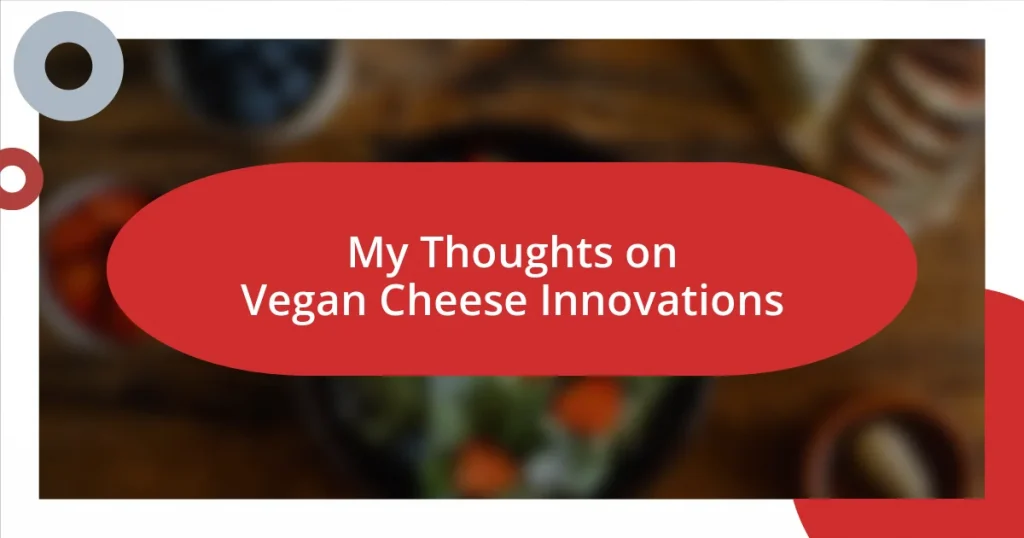Key takeaways:
- Innovative vegan cheese products utilize diverse plant-based ingredients like nuts, seeds, and fermented plants to recreate traditional cheese flavors and textures.
- Health benefits of vegan cheese include lower cholesterol, healthy fats, and probiotics, contributing to better heart and digestive health.
- Future trends in vegan cheese include eco-friendly production methods, new ingredients like chickpeas, and technological advancements like 3D printing, promising exciting culinary possibilities.
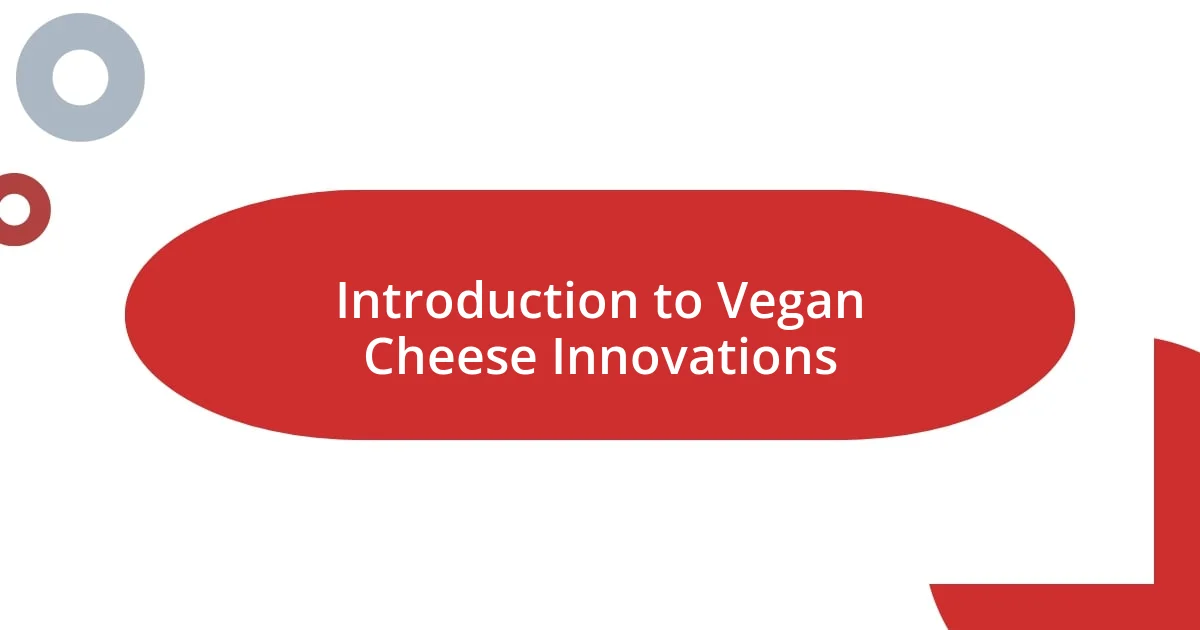
Introduction to Vegan Cheese Innovations
Vegan cheese innovations have really transformed the way we think about dairy alternatives. I remember the first time I tried a cashew-based cheese spread—its creamy texture blew my mind! These advancements not only cater to vegans but also to anyone looking to reduce their dairy intake without sacrificing flavor.
As I explored more options, I was struck by the creativity behind each product. Did you know some brands are crafting cheeses using fermented plants to mimic that classic tangy taste we associate with traditional cheese? It’s fascinating how culinary techniques are evolving to create flavors that are undeniably delicious while staying cruelty-free.
I can’t help but feel a sense of excitement for the future of vegan cheese. With innovations constantly emerging, it feels like we are just scratching the surface of what’s possible. How many new flavors and textures can we discover? It’s a thrilling journey, and I’m eager to see where it leads us next.
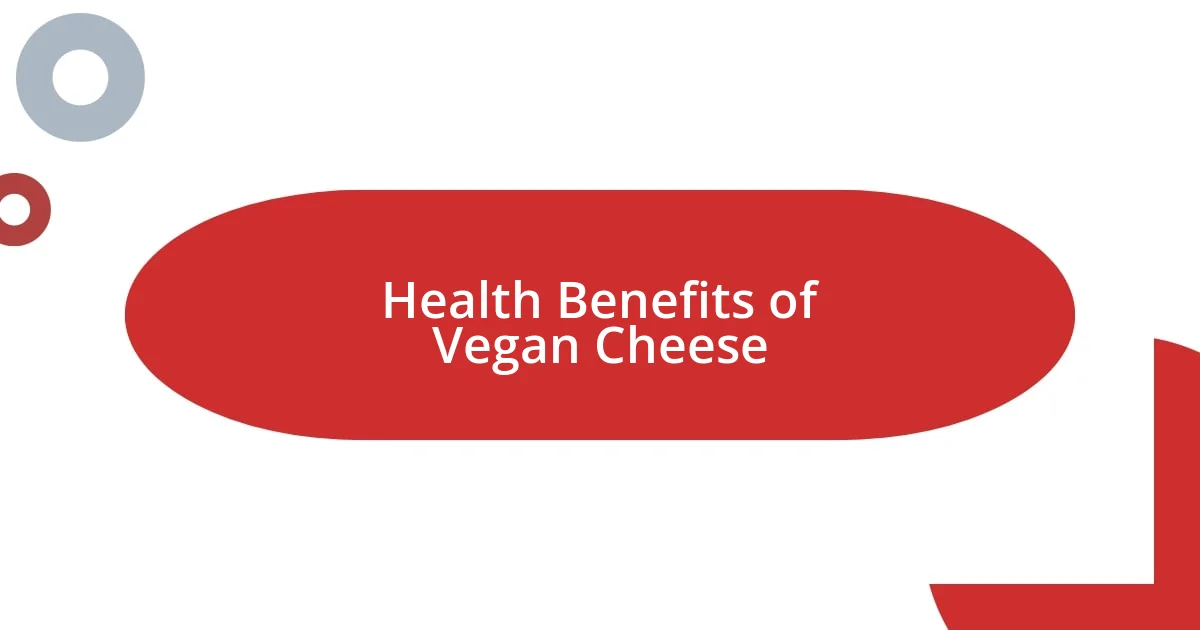
Health Benefits of Vegan Cheese
When I first started experimenting with vegan cheese, I was amazed to discover that many of these products can be quite nutritious. For instance, nut-based cheeses often provide healthy fats and protein, which contribute to better heart health. I still remember making my first cashew cheese at home—it felt like a nutritious triumph, and I even added in some nutritional yeast for that cheesy flavor along with B-vitamins.
Another standout benefit of vegan cheese is its lower cholesterol content compared to traditional dairy cheese. Having struggled with high cholesterol in the past, I found that incorporating vegan options into my diet made a real difference. It’s incredible how a simple swap can contribute to better heart health—that little change opened the door to a world of flavors that are both delightful and good for me.
Many vegan cheeses also contain beneficial ingredients like probiotics, particularly those made through fermentation. I accidentally stumbled upon a brand that included live cultures, and it not only satisfied my cheese cravings but also supported my digestive health. It was a pleasant surprise to find something I loved that was kind to my body—a true win-win in my culinary adventures!
| Type of Cheese | Health Benefits |
|---|---|
| Nut-based Cheese | Rich in healthy fats, protein, and nutrient content |
| Coconut-based Cheese | Low in cholesterol, supporting heart health |
| Fermented Cheese | Contains probiotics for gut health |
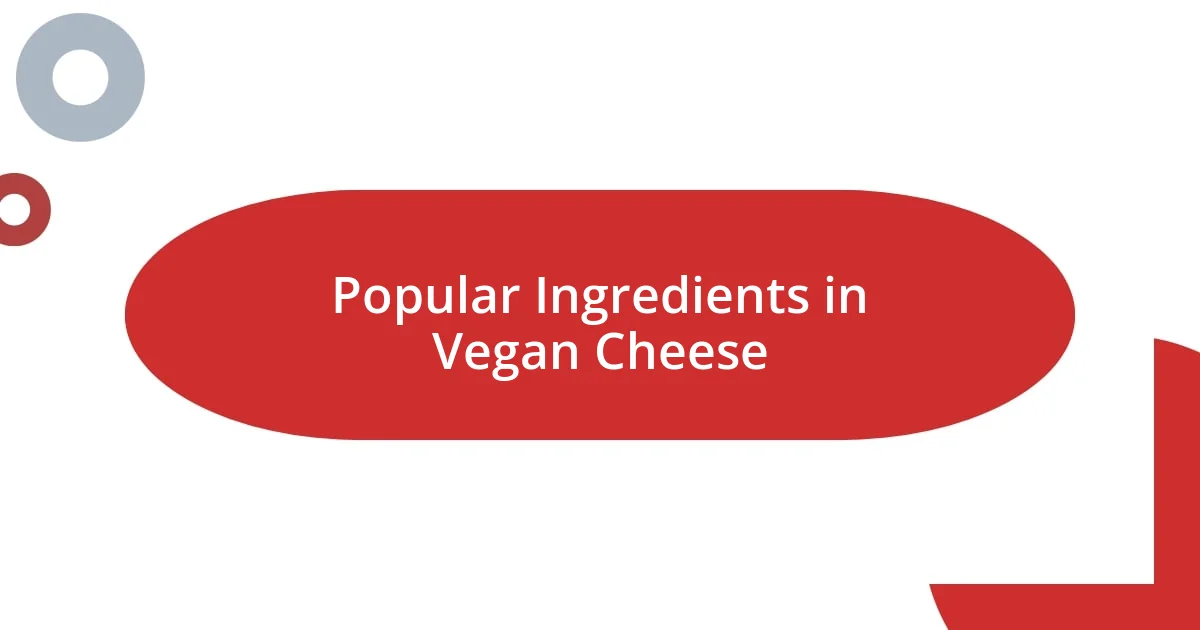
Popular Ingredients in Vegan Cheese
When delving into the world of vegan cheese, I’ve come to appreciate a range of innovative ingredients that form the backbone of many delicious varieties. Each ingredient brings its own unique character, and it’s quite fascinating how these components can recreate the creamy, tangy essence we often crave. For me, the first time I tasted a cheese made from blended nuts and seeds, it felt like uncovering a hidden gem in the plant-based universe.
Here are some of the most popular ingredients found in vegan cheese:
- Nuts and Seeds (like cashews and almonds): These add creaminess and a rich flavor profile, making them favorites in many recipes.
- Nutritional Yeast: With its cheesy taste and a boost of B vitamins, this ingredient is a game-changer for flavor enhancement.
- Coconut Oil: Often used for its meltability, it mimics the texture of traditional cheese quite effectively.
- Fermented Ingredients (such as tofu or tempeh): They introduce a tangy flavor reminiscent of aged cheeses, offering depth and complexity.
- Arrowroot or Agar-Agar: These natural thickeners help achieve that creamy consistency, perfect for spreads or slices.
I often find myself experimenting with different combinations of these ingredients, with each new creation leading to delightful surprises. The first time I crafted a soft, spreadable cheese from cashews and nutritional yeast, I felt a jolt of joy as I enjoyed it with fresh fruit. It was not only a refreshing snack but a moment of triumph in my kitchen escapades. The versatility of vegan cheese ingredients invites culinary exploration, empowering me to nourish both my body and soul.
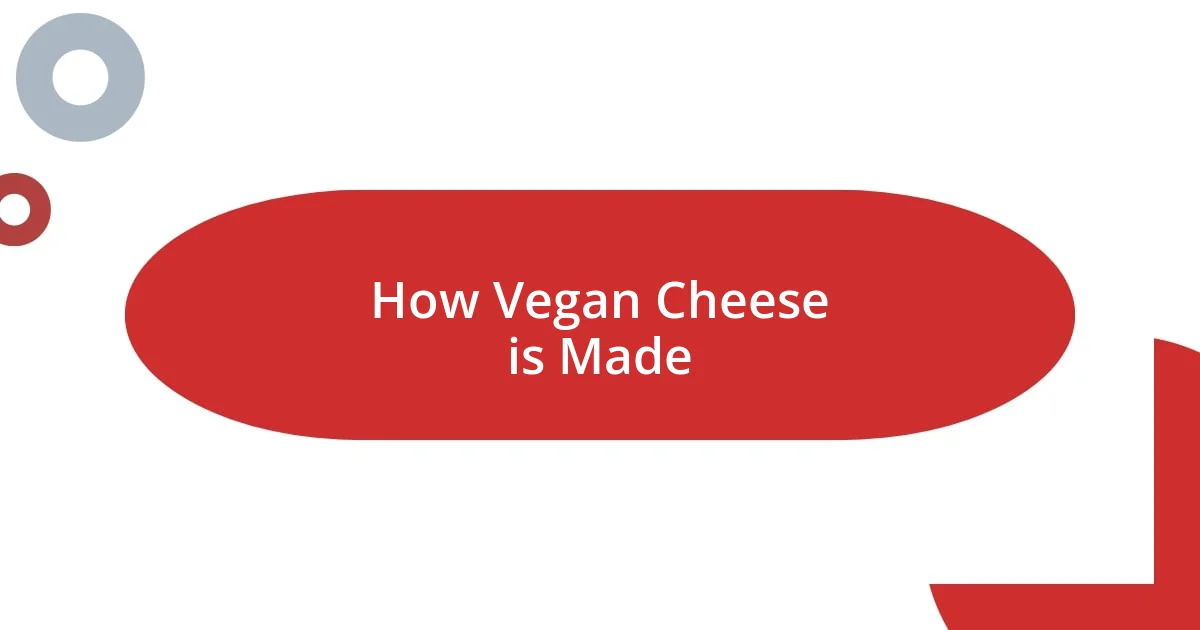
How Vegan Cheese is Made
Creating vegan cheese can feel like a culinary adventure, driven by the creativity of plant-based ingredients. Typically, the process starts with nut-based ingredients, like cashews or almonds, which are soaked and blended until they reach a creamy consistency. I vividly recall my initial attempt to make cashew cream—what a messy yet rewarding experience! Blending nuts with a splash of lemon juice and a pinch of salt truly unlocked a new world of flavor.
The magic continues with the addition of elements like nutritional yeast, which I adore for its cheesy essence. It adds a layer of umami that elevates the whole dish. When I first sprinkled it into my cheese mixture, I remember thinking, “Is it really this easy to replicate that cheesy goodness?” The results were astounding, and that initial surprise propelled me further into the realm of vegan experimentation.
Fermentation, too, plays a crucial role in crafting certain varieties of vegan cheese. By incorporating live cultures and letting the mixture develop over time, one can achieve that delightful tang reminiscent of traditional cheeses. I once left a batch of fermented nut cheese on the counter overnight, and the aroma the next day was intoxicating! Tasting it was like a burst of flavors dancing on my palate, proving that patience truly pays off in the vegan cheese-making process.
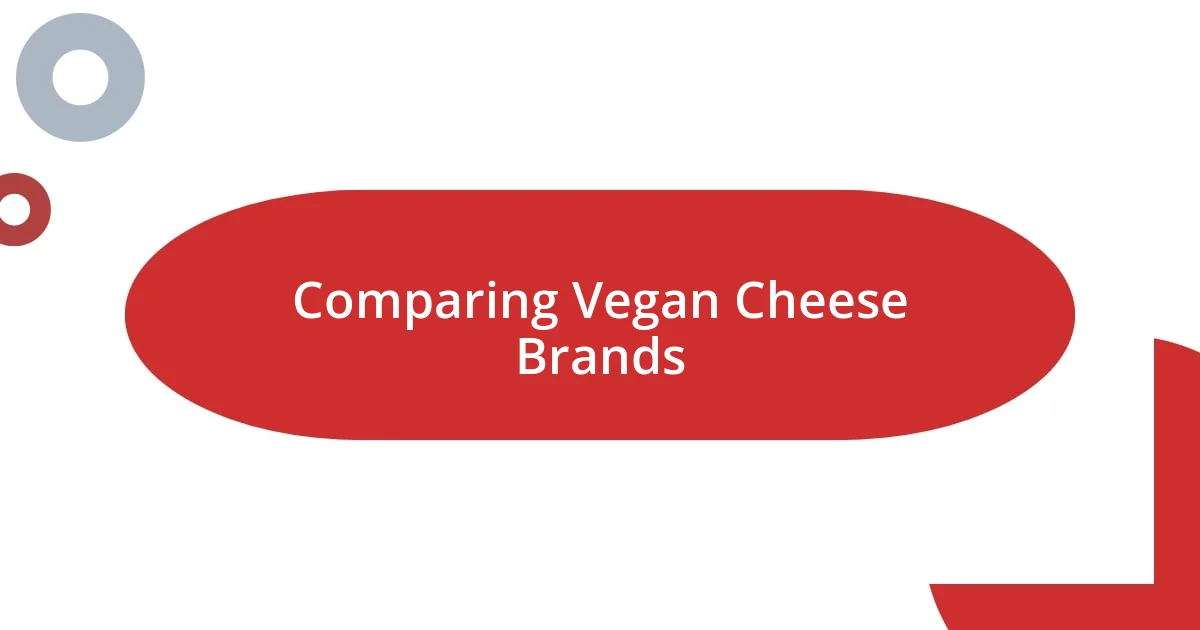
Comparing Vegan Cheese Brands
When evaluating different vegan cheese brands, I often find myself testing for flavor, texture, and meltability. For instance, I remember a tasting session where I tried a creamy almond-based cheese that spread beautifully on crackers, while another brand made from coconut oil offered a satisfying stretch when melted on a pizza. It had me pondering: how can two products with similar ingredients yield such distinct experiences?
One of the things I cherish in comparing vegan cheeses is uncovering the stories behind each brand. I once discovered a local brand that boasted artisanal methods and fermentation techniques reminiscent of traditional cheesemaking. Their unique approach made each bite an adventure, and it sparked a delightful conversation with a friend who was skeptical about plant-based alternatives. I couldn’t help but ask, “Could this be the future of cheese that actually rivals the dairy version?” The shivers of excitement were palpable with each tasting.
When it comes to price, I’ve noticed a wide disparity among vegan cheese options. Some premium brands offer exclusive blends that can be a bit pricey, while others provide more accessible choices without sacrificing quality. I recall picking up a budget-friendly brand and being pleasantly surprised—it melted perfectly in my quesadilla, fueling my next exploration of vegan cheese brands. That inexpensive cheese made me realize that delicious doesn’t always have to come with a hefty price tag.
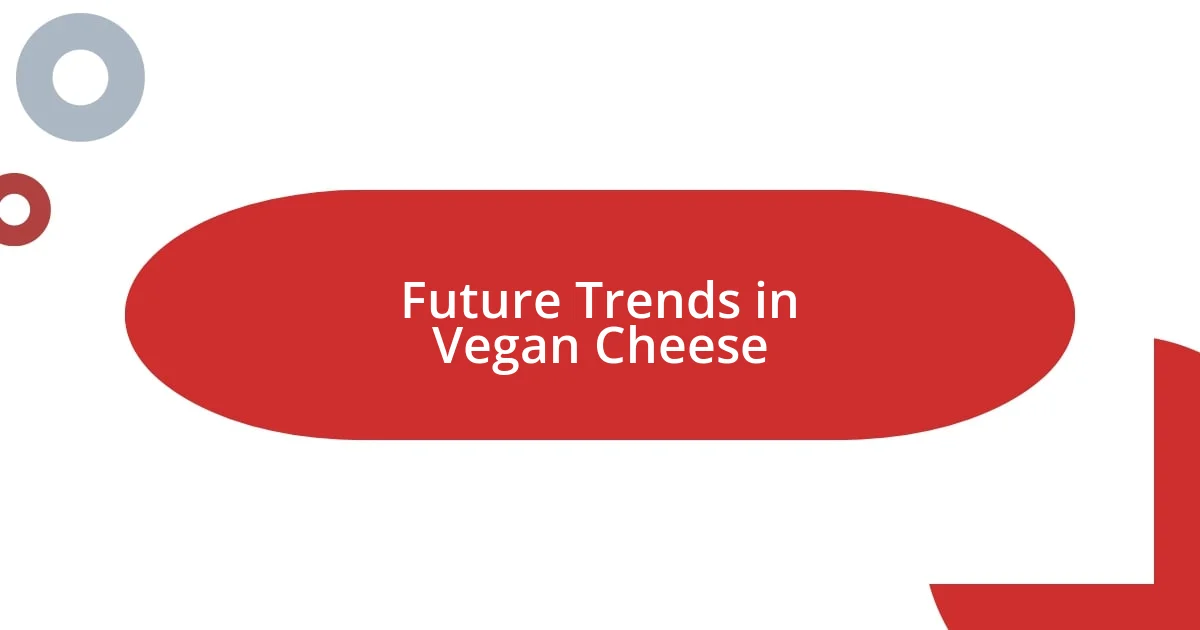
Future Trends in Vegan Cheese
As I look ahead, one trend that is excitingly emerging in the vegan cheese space is the use of innovative ingredients beyond traditional nuts and soy. I recently came across a brand utilizing chickpeas to create a dairy-free feta that sparked my curiosity. Could this be the game-changer that introduces textures and flavors we’ve never encountered before? The potential for new plant-based options feels almost limitless, and it reminds me that there’s a whole world waiting to be explored.
Environmental sustainability is also becoming a focal point for vegan cheese producers. Many brands are now committing to eco-friendly sourcing and production methods. I once spoke to a founder who passionately shared how their team reduces food waste by repurposing leftover plant materials. It made me think—what if our cheese choices could simultaneously nurture our health and the planet? The concept of food that aligns with our values is becoming more enticing, and it’s reshaping what we consider gourmet.
Finally, the technology behind vegan cheese is set to advance rapidly. I’ve seen incredible innovations, such as the development of 3D-printed cheese products. When I first heard about this concept, it seemed like something out of a sci-fi movie! I can only imagine the unique culinary experiences that would result from such advancements. Isn’t it thrilling to think about the potential for vegan cheese to evolve alongside tech, granting us flavor profiles and textures just waiting to be tasted? The future of vegan cheese looks more promising than ever, and I can barely wait to see what’s next.










